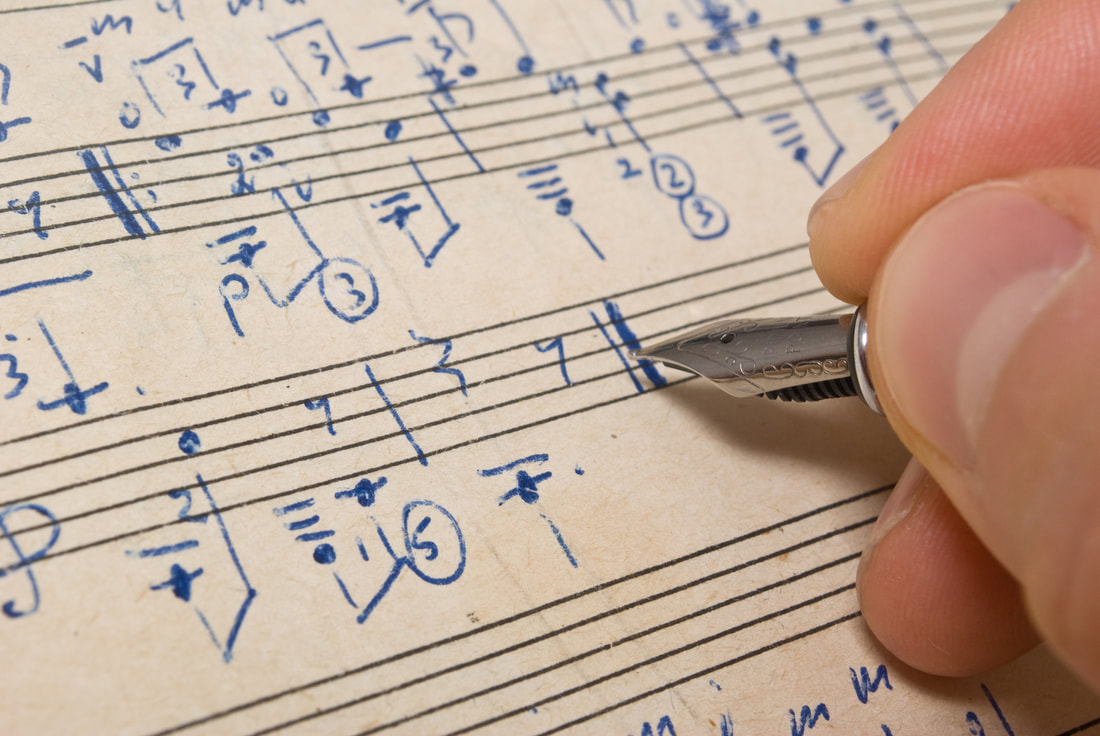|
collaboration [noun]
The process of two or more people working together to create or achieve the same thing. As Duo Sequenza, we are musicians who promote the work of living composers. This means that we perform works by composers who are writing today’s classical music. It also means that we occasionally have a very special experience as musicians: commissioning a piece of music. This means asking a composer to write something specifically for us, and it’s a unique journey of collaboration we undertake together. Before we share what it’s like, we want to address a stereotype. When people hear “today’s classical music,” they sometimes grimace. They’re either thinking it’s old school and stuffy, or they’re already bracing themselves for something that sounds a lot like “noise.” Neither is true. Today’s classical music can be beautiful, lyrical, and completely enjoyable to listen to. This is at the heart of our mission to bring new audiences to classical music, and we do it through what we call “wickedly great” repertoire. We’ve always leaned toward working with Midwestern composers because we’re an ensemble based in the Midwest. Many people think that New York City is the classical music capital of the country; the reality is that there are terrific composers writing beautiful contemporary classical music right here in our own backyard. Let us share a couple of stories. Duo Sequenza’s first commission Our first commission was Rondo Caprice, Op. 35 by Easley Blackwood, composed in 1992. At the time, Easley was on the University of Chicago faculty (Midwest, see?). While he’d been writing in a microtonal style in the 1970s and 1980s, he was returning to diatonic (tonal) works, and we thought he’d write an interesting piece. We called him up, told him we were in the market for a commission and planned to debut it at the Bar Harbor Music Festival’s New Composers program in Maine. We shared one of our recordings to give him a sense of our playing. Easley wrote a one-movement theme and variations in traditional rondo form. It’s very tonal with a fresh, unique harmony throughout the piece. His inspiration was Franz Schubert, who was a fan of the guitar—so Easley wrote it as he felt that Schubert would have written for flute and guitar, had he lived another 30 years. As Easley composed, he sent us sections, and we even went to his apartment to rehearse the piece during his writing process. Duo Sequenza’s South Shore Suite commission Fast forward to 2016. It’s the early days of our return to concertizing, in Indiana’s Bicentennial year. We had the idea that we needed a work to mark this special occasion, a signature piece to spark local interest in our ensemble. Because it was Indiana’s 200th birthday and we are an Indiana-based ensemble, we thought our composer should be from Indiana, too. So, we started to do some homework. We compiled a list of Indiana composers and we listened to some of their work online, largely so Paul could hear how they handled writing for the guitar (which can be tricky). This led us to Jorge Muniz, a native of Spain who had been in the US for many years and was on the composition faculty of the Ernestine M. Raclin School of the Arts at Indiana University South Bend. We approached him and described our vision for a signature piece with geographical flavor. The result is South Shore Suite, a six-movement work written in October 2016 and premiered in January 2017. While we were not involved in the composition process as we were with Easley, Jorge had attended a few of our concerts at the Memorial Opera House in Valparaiso, so he knew our programs were thematic and had a good sense of our capabilities as performers. About South Shore Suite and the commission, Jorge shared, “There is nothing more fulfilling to me than a close collaboration with performers in the making of a new composition. The conversations with Duo Sequenza as my South Shore Suite was being designed were fundamental in shaping this new work. It is wonderful for a composer to have such talented and expressive musicians at my disposal. It makes the process of composition a deeply enjoyable one!” A word about world premieres: we’ve never been truly happy with our first performance of new pieces. The music changes and grows the longer we keep it in our repertoire. Audience reactions to new works also develop the pieces musically. When commissioning a composer, we try to give ourselves eight to 10 weeks to learn a piece and rehearse together, but even that can feel rushed. Other world premieres Even when we’re not specifically commissioning, we get unsolicited manuscripts from composers. Some have sent them out to multiple duos, and whoever secures a venue first gives the world premiere. Sometimes we also find our way to interesting collaborations, as with Andrea Clearfield, who composed Farlorn Alemen, a piece we’ve included on our next album. We reached out to her after hearing one of her pieces for the woodwind quintet and asked if she’d ever written anything for flute and guitar. She’d written a song cycle on commission for soprano and piano that she had begun to imagine as a song without words for flute and guitar. After playing the piece in progress, we shared our insights and collaborated with Andrea for a final version. The biggest change was my (Deb’s) idea to transcribe it for alto flute. This wasn’t a commission so much as a collaboration that started with the composer’s inspiration and grew with ours. Of our collaboration, Andrea said, “Duo Sequenza premiered a new arrangement of my work Farlorn Alemen for alto flute and guitar. I met with Debra earlier and was impressed not only by her beautiful tone and naturally musical playing but her dedication to excellent preparation and embodying the music's intent. The duo's interpretation was sensitive, intelligent, and deeply moving.” Are there any commissions on the horizon? All we can tell you right now is, stay tuned!
0 Comments
|
AuthorWrite something about yourself. No need to be fancy, just an overview. Archives
March 2022
Categories |


 RSS Feed
RSS Feed





